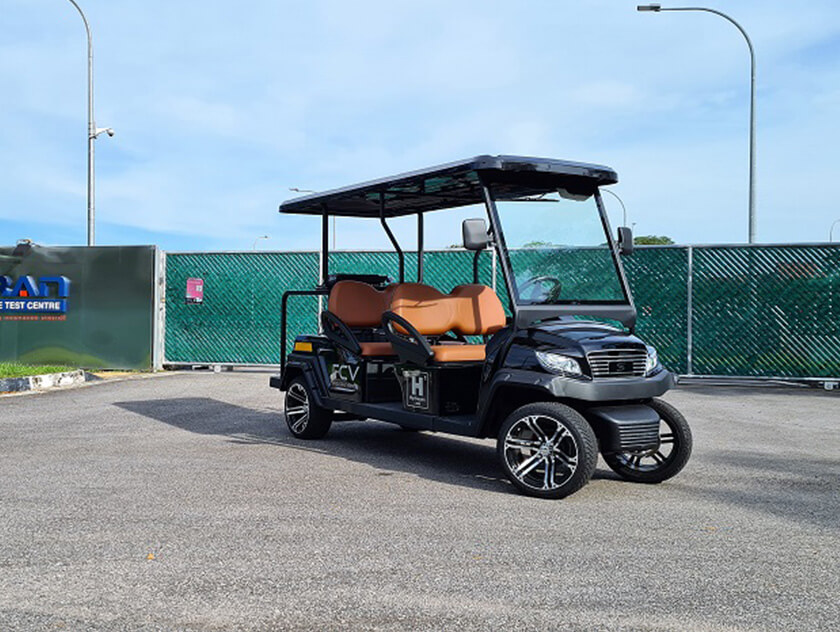
In Silicon Valley, many startups, like Google, are known to have begun in the founder’s garage. Spectronik too had similar beginnings before they found success. Founded by 32-year-old Jogjaman Jap in 2011, Spectronik manufactures hydrogen fuel cells and Mr Jogjaman started his business by handmaking prototypes in his bedroom. He impressed a US-based aerospace giant with the prototype and landed his first contract to provide fuel cells for a military application drone in 2013, no mean feat for a small startup with only seven staff. In 2014, Spectronik won a $500,000 Technology Enterprise Commercialisation Scheme (TECS) Grant from SPRING Singapore. “The TECS is a very competitive grant so winning it is a strong testament to our technical credentials,” says Mr Jogjaman.
Mr Jogjaman says he first came up with the idea for starting Spectronik because he saw a market gap in providing power for drones. Drones primarily use lithium batteries, which limits their flight time. With hydrogen fuel cells, their flight time could be extended by nearly 4 to 5 times. Today, Spectronik has around 20 clients in the military, defence and aerospace industries, using its fuel cells to power unmanned aerial vehicles (UAV) that can be used for applications like surveillance or search and rescue operations at sea.
Spectronik is among the first batch of startups to move into the newly completed JTC LaunchPad @ Jurong Innovation District (JID) which houses startups specialising in urban solutions, advanced manufacturing and engineering.
Beyond drones, Spectronik plans to do research and development work to create bigger power fuel cells to power automotive vehicles. A few blocks away, JTC, Land Transport Authority and Nanyang Technological University had jointly opened the Centre of Excellence for Testing and Research of Autonomous Vehicles (CETRAN) to help companies test-bed and develop self-driving vehicles.
We find it a great advantage being at JTC LaunchPad @ JID because it serves as a living lab for the test-bedding of innovative solutions. For companies in our field, we need more than just money and office space, we also need a relevant test-bed environment for product validation.
Mr Jogjaman has his sights set on creating bigger power hydrogen fuel cells to power the self-driving vehicles at CETRAN. “We moved from the old premises at Bukit Batok Industrial Park to JTC LaunchPad @ JID to facilitate our future business and operation needs,” he elaborated. “We find it a great advantage being at JTC LaunchPad @ JID because it serves as a living lab for the test-bedding of innovative solutions. For companies in our field, we need more than just money and office space, we also need a relevant test-bed environment for product validation.”
On the benefits of clustering similar companies in JTC LaunchPad @ JID, Mr Jogjaman shared, “JTC does a great job by creating different themes in different environments,” Mr Jogjaman says. “For example, people know that JTC LaunchPad @ one-north has a good cluster of InfoComm Media startups. Over here at JTC LaunchPad @ JID, it’s more green, more quiet and serene, which suits the image and characteristic of cleantech companies like us.”

“Our overseas customers recognise the value of our CleanTech Park address. It is also an optimal location for us because our key suppliers are in the vicinity, for example, our hydrogen gas supplier is located at Jurong Island while our electroplating partner is in Tuas.”
He also notes that the clustering effect of startups is beneficial because it brings together businesses that are complementary. "Our neighbours specialise in microgrids, robotics and advanced manufacturing, and are in the same hardware and cleantech domains like us. They face a similar set of challenges such as customer acquisition, scaling-up and fundraising. We regularly share our experience, encourage and learn from each other."
Mr Jogjaman also likes the idea of the prototyping workshop that will be located at Level 2 of JTC LaunchPad @ JID, which will be a space for companies to test-bed new innovations and exchange ideas by leveraging on the shared facilities, including shared equipment, tools and production space. “The prototyping workshop provides us with shared resources that our neighbours need too, like 3D printers. It’s good for all as it saves space and cost.”
“So far, JTC LaunchPad @ JID has lived up to our expectations – we know what we signed up for and it did not disappoint,” says Mr Jogjaman.

